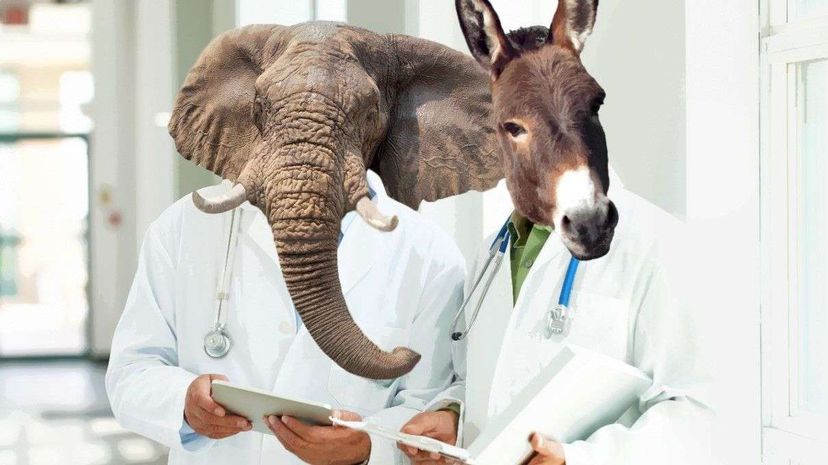
With only two weeks left in an ugly, drawn-out presidential campaign season, the weary citizens of the "divided states of America" are ready to forget the political scandals and mud-slinging TV ads and get back to normal life. But what if we can't escape politics? What if even one of the most trusted and private interactions — that between doctor and patient — is colored by "red" or "blue" glasses?
In an remarkable study from Yale University, researchers have found significant differences in the way Republican and Democratic physicians treat and counsel their patients when it comes to highly politicized issues like marijuana use, abortion and keeping guns in the home.
Advertisement
Eitan Hersh is an assistant professor of political science at Yale and lead author of the study. An expert on political polarization, Hersh suspected that doctors, like most Americans, struggle to separate their political beliefs from their professional lives. His hypothesis was based in part on personal experience.
"My father suffers from PLS, a motor neuron disease similar to ALS," Hersh says. "He had to switch primary care doctors because she wouldn't prescribe medical marijuana in a state where it's legal."
It's been well-documented that doctors aren't immune to implicit biases. Patients of color receive markedly lower levels of care that can result in significant negative health outcomes, and male and female patients receive different treatment based on the sex of their physician. But the Yale study is the first time that personal political beliefs have been proven to impact treatment decisions.
Using public voter registration rolls and some algorithmic magic, Hersh and his colleagues identified the political affiliation of 60,000 physicians across 29 states. They mailed out surveys to a smaller random sample of those doctors — all primary care physicians — and asked them to rank nine different patient scenarios on a "seriousness" scale of 1 to 10. (The researchers received about 231 responses and 63 percent of them were from Democrats.)
The hypothetical scenarios included a 38-year-old male acknowledging that he drinks 20 alcoholic beverages in a typical week and a 28-year-old woman reporting she had two elective abortions in the past five years. In another scenario, a patient with two small children says that she stores guns in the house.
Hersh found almost no difference in the way physicians from both political parties treated issues like alcohol consumption, depression, obesity, or even having sex with prostitutes (everyone agreed: bad idea). But he did find some glaring differences in the way Republican and Democratic doctors approached marijuana use, abortion and guns.
On average, Republican primary care physicians were much more concerned about marijuana use and past abortions than their Democratic colleagues, while Democrats showed significantly more concern about having guns in the house with kids.

When it comes to treatment plans, "red" doctors were far more likely to counsel marijuana users on the health and legal implications of toking up, and to discuss the "mental health aspects" of abortion and to discourage patients from having them. Interestingly, while Democratic physicians thought guns in the home were a much bigger deal, Republican docs were more likely to discuss safe gun storage with their patients.
Hersh knows that choosing a political party doesn't happen in a bubble. Political affiliation is influenced by myriad factors like gender, geographic location, economic status, racial or ethnic background and religious beliefs. That's why his team went to great lengths to control for all of these variables.
"That's what was so astounding — basically none of that stuff matters," says Hersh. "Compared to all of those variables, political affiliation is a way stronger predictor of how a physician will respond."
Just as many women feel more comfortable with a female doctor, Hersh says that it might be time for patients with politically sensitive medical issues to search for physicians who share their political opinions.
Not everyone agrees. Dhruv Khullar, writing in Slate, says that it's dangerous to encourage patients and doctors to "pair off" by political parties.
"We already live in social and political echo chambers. Let's not create medical ones, too," writes Khullar, resident physician at Massachusetts General Hospital and Harvard Medical School. "Do we really want a future in which Democratic patients avoid Republican doctors and vice versa?"
Instead of encouraging patients to research their doctor's political affiliation, Khullar says the solution should come from inside the medical profession by training physicians to better recognize their own implicit biases. But Hersh doesn't think we can wait around for reform.
"In the long term, we certainly hope that medical professionals take this and other studies on racial and gender bias to heart," says Hersh. But for now, politics trumps all else. "If I'm a woman looking for an OB-GYN, and I can base my decision on two pieces of information — whether a doctor is a Republican or Democrat, or where they went to medical school — I'd absolutely rather know their party affiliation."
Would Hersh go so far as to publish his well-researched list of 60,000 doctors and their political affiliations?
"It's a touchy thing," Hersh says. "Obviously some doctors would be very upset about it. What I'd like to see is more research exploring the contours of the patient-doctor relationship. If the research community confirms that this is something that would help more patients get the care they need, I'd definitely publish the list."
Advertisement